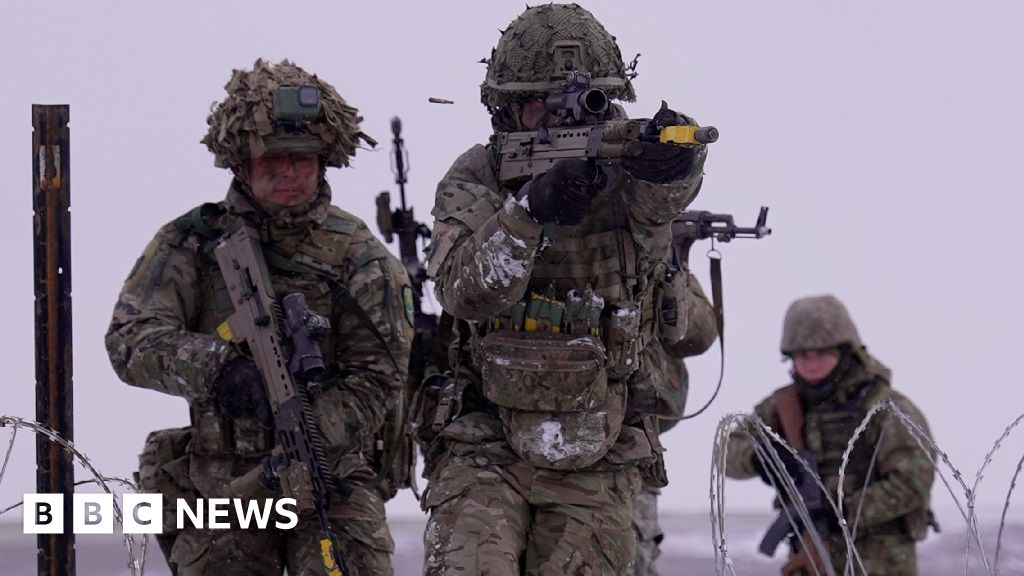Dozens injured in suspected car ramming attack in Munich

 Getty Images
Getty ImagesAt least 30 people have been injured, some seriously, after a car was driven into a crowd in Munich, just a week before the country’s federal elections.
The driver was a 24-year-old Afghan asylum seeker, police said, and was identified in local media as Farhad N. He was arrested at the scene.
Police said counter-terrorism officers have taken over the investigation due to indications the suspect had an “extremist background”.
It comes after a series of deadly attacks in Germany – with some allegedly perpetrated by immigrants. Chancellor Olaf Scholz said the driver “must be punished and he must leave the country”.
It has also taken place on the eve of the Munich Security Conference – with world leaders, including Ukraine’s President Volodymyr Zelensky and US Vice President JD Vance, due to arrive in the city.
The ramming occurred during a transport workers’ union rally at around 10:30 local time (09:30 GMT) on Thursday.
The car was seen approaching police cars at the rally in Dachauer Strasse, a short distance from Munich’s main train station, before speeding up and driving into a crowd police said. Police shot at the vehicle before detaining the man.
Rescue helicopters were quickly at the scene and Munich’s mayor Dieter Reiter said children were among those injured.
Eyewitnesses told the BBC they saw people running for shelter in shops and residential buildings as the “distressing” scene unfolded.
“It is obviously very unsettling,” said a student who had been studying in a nearby coffee shop. “I can’t concentrate on anything else.”
The car ramming again brings issues of immigration and security to the forefront of federal elections due to take place on 23 February.
According to the the German Press Agency, the suspect came to Germany in 2016 as a minor and had his request for asylum turned down the following year.
The agency said he was meant to be deported in autumn 2020.
Bavarian interior minister Joachim Herrmann said he had not been forced to leave Germany due to security concerns in Afghanistan.
Munich Police said the suspect had a valid residence permit at the time of the collision.
 Getty Images
Getty ImagesBavaria’s Premier Markus Söder called the incident a “suspected attack”.
“Something has to change something in Germany – and quickly,” he said.
For Germans there were immediate reminders of an attack on a Christmas market in Magdeburg less than two months ago that killed six people and injured 300 others.
“When you get the news that someone has once again driven a car into a crowd of people, the fact that there are many injured, is a slap in the face,” said Premier Söder.
“We will clarify all the details, but we react cautiously to every attack like this.”
Police said they could not confirm whether anyone else was involved, following unconfirmed reports of a second person in the car.
They appealed for witnesses to come forward with information and footage of the incident.
Bavaria was hit by an attack only three weeks ago, when a toddler and a man aged 41 were killed in a stabbing at a park in the town of Aschaffenburg.
It soon emerged that the suspected attacker was an Afghan national with suspected jihadist sympathies, and Olaf Scholz had called on authorities at the time to explain why he was still in Germany.
Repeated attacks have propelled the issue of immigration and asylum policy to the forefront of Germany’s 23 February election, with the far-right Alternative for Germany (AfD) running second in the opinion polls.
The party’s candidate for chancellor, Alice Weidel, has publicly backed calls for “remigration”, seen as referring to mass deportations of immigrants.
Scholz, whose centre left Social Democrats are trailing behind the AfD, said the government was planning to increase deportations of serious criminals to Afghanistan. Deportations to Kabul began last August.
In a separate development, an Afghan man with suspected Islamist sympathies went on trial at a high-security prison in Stuttgart over a knife attack that killed a policeman and wounded five other people at an anti-Islam rally in Mannheim in May last year.
Months later, three people were murdered by a man armed with a knife in the western city of Solingen. A Syrian who was due to be deported was arrested, and jihadist group Islamic State said it was behind the attack.
World News || Latest News || U.S. News
Source link




